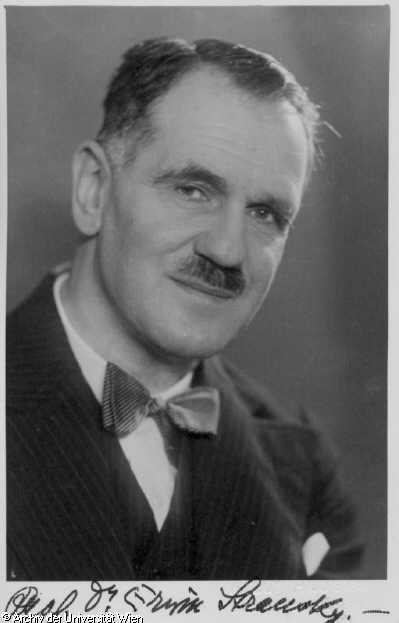
| Born: | 07-03-1877 |
| Faculty: | Medical School | Medical University Vienna |
| Category: | Expelled teacher |
Erwin STRANSKY (born on July 3rd, 1877 in Vienna, died on January 26th, 1962 in Vienna) was lecturer ("Privatdozent") in psychiatry and neurology at the Medical School of the University of Vienna.
He was persecuted in times of Nazism as a Jew lost his position and was forced to leave the university on April 22nd, 1938.
After graduating from the Communal-, Real- und Obergymnasium in Vienna II (today: Sigmund Freud-Gymnasium) in 1894, Stransky studied medicine at the University of Vienna from the fall term of 1894 (among others with the pioneer Prof. Heinrich Obersteiner) and received his doctorate (Dr.med.univ.) in 1900. In 1901 he became an aspirant at the Vienna General Hospital and worked at the I. Psychiatric University Clinic under Julius Wagner-Jauregg, where he habilitated in psychiatry and neuropathology at the University of Vienna in 1908 with a thesis on "Dementia praecox". In 1915, during World War I, he received the title (but not the position) of associate professor ("Privatdozent, tit. a.o. Univ.-Prof.").
From as early as 1906 Stransky was also a psychiatric expert at the Commercial Court in Vienna, from 1911 he was also the neurologist for the Association of Vienna Cooperative Health Insurance Funds, and from 1915 he was a psychiatric expert for the Viennese military courts with the rank of major physician. He demanded, as was widespread in university and non-university psychiatry at the time, the submission of patients to the will of the doctor and published scientific articles about sending mentally ill people - as "psychopathic inferiors" - to the front in World War I, since "their reproduction was less desirable" and also held rather radical German nationalist views in other respects. Ideological points of contact were also present in his writings "Grossdeutschland und die Aerzteschaft" and "Der Deutschenhass. Eine Studie" (1919), which, among other things, testify to his anti-Slavic and Greater German attitude by means of a racist-biological foundation. He was involved in various German nationalist parties and supported illegal National Socialists during Austrofascism.
Nevertheless, and although he had converted to the Protestant faith since 1902, he was persecuted under National Socialism on racist grounds and was removed from office and expelled from the University of Vienna on April 22nd, 1938. However, he was able to remain in Vienna - not least thanks to his wife, the opera singer Josefine Stransky, who was "Aryan" according to Nazi criteria.
After the end of the war, in 1945, at the age of 68, Stransky was entrusted with the reconstruction and management of the Nervenklinik am Rosenhuegel, and in 1946 he was again awarded the venia legendi by the University of Vienna, as well as the title of "tit.o.Univ.-Prof.". In 1947 he retired, but continued to teach as an "honorary professor" at the University of Vienna until 1951.
He published over 200 scientific papers, was a pioneer of schizophrenia research and a great opponent of psychoanalysis, was a pioneer of psychohygiene both in the interwar period and after 1945 (with Otto Kauders he founded the Austrian Society for Psychohygiene) and worked in the fields of manic-depressive diseases, anatomy of inflamed nerves, applied psychopathology, psychohygiene and multiple sclerosis.
His two-part "Textbook of General and Special Psychiatry" (1914, 1919) was a standard work for a long time and influenced generations of students and physicians.
He was a member of numerous scientific societies (including honorary member of the American Psychiatric Association since 1933) and recipient of numerous awards (including the Decoration of Honor for Art and Science of the Republic of Austria).
He died in Vienna on January 26th, 1962, and was buried in a grave of honor at the Vienna Central Cemetery.
The "Stransky-Weg" was named after Stransky in Vienna's 14th district in 1974. This street naming, today considered problematic, has been under discussion since 2013.
Lit.: Archive of the University of Vienna/personnel roster 1937/38, rectorate GZ 677 ex 1937/38, senate S 304.1253; MERINSKY 1980, 261-265; MUEHLBERGER 1993, 34; Daniela ANGETTER, Erwin Stransky, Biografie des Monats, ÖAW 2012; Peter AUTENGRUBER, Birgit NEMEC, Oliver RATHKOLB u. Florian WENNINGER, Umstrittene Wiener Straßennamen. Ein kritisches Lesebuch. Wien 2014, 56–58; REITER-ZATLOUKAL/SAUER 2022; UB MedUni Wien/van Swieten Blog; wienwiki; wikipedia.
Herbert Posch